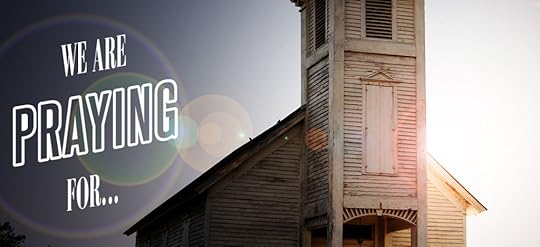Thom S. Rainer's Blog, page 106
October 16, 2019
Ten Signs a Church Staff is Really Happy Together

By Chuck Lawless
Occasionally over the last few years, I’ve spent time with a church staff that seemed really happy together. Here are some characteristics that mark those teams:
They spend time together outside the office. They don’t run from each other as soon as the workday is over. They’re not “business acquaintances”—they’re friends.
They know each other’s families. They know the names of spouses and children. Even the most introverted of the group fits in somehow.
They laugh a lot. That’s because they actually have fun together. They’re comfortable hanging out just for the fun of it.
They work hard together. They share a common vision, and their commitment to that vision and to each other results in diligent, consistent work.
They help each other succeed. Nobody’s fighting a turf war. Everybody’s on the same team, and they know that the success of one contributes to the success of all.
They battle out their differences in a healthy way. They disagree at times, but they do it in a biblical way. And, after they’ve reached a conclusion, they present to the congregation a genuinely united front.
They’re committed where they are. Nobody’s actively looking for a new position. When you enjoy being part of the team, you don’t think much about the next opportunity out there.
Their happiness is infectious. Whether they’re sharing announcements or kneeling at the altar, you can just tell they love each other. Sometimes, they’re the first united, excited staff team their church has ever seen.
They don’t see themselves as silos. Even when the church structure promotes silos, they fight against that tendency. They intentionally think about how their individual ministries connect with others.
They pray a lot together. Their prayers aren’t just reactions to needs; they’re heartfelt intercession for brothers and sisters who serve as a team. They’re a confession of “Lord, we want to do this together, but we can’t do this at all without you.”
What other characteristics of healthy staff teams have you seen?
October 15, 2019
Six Questions to Consider If a Staff Member Becomes a Candidate to Be Pastor – Rainer on Leadership #580

Podcast Episode #580
SUBSCRIBE:
iTunes • RSS • Stitcher • TuneIn Radio • Google Play • iHeart Radio • Spotify
Thom and Sam discuss the possible scenarios in which a staff member can transition into a lead pastor role. The discussion considers several perspectives including the internal candidate, external candidate, and potential impact on the church.
The six questions from today’s podcast:
Will the staff member have a highly visible role in the interim?
Should staff members resign if they don’t become the pastor?
Does such a move allow for a better transition?
Is a known better than an unknown?
Are alliances formed with the possibility of disappointment?
Do you communicate the possibility to other candidates?
Other highlights:
Be very cautious in a season of change. It’s hard to keep being an internal candidate a secret.
In most scenarios the internal candidate will have to resign, so be prepared to resign.
If you have an internal candidate then alliances will be formed.
Talk and pray with your spouse because change is going to happen.
Do not side step the search process as an internal candidate.
An external candidate should be made aware of an internal candidate.
Episode Sponsors
 Vanderbloemen has been serving churches for nine years, but did you know that Vanderbloemen also serves Christian schools, nonprofits, and Christian businesses? So if you’re listening, and you know a Christian school, nonprofit, or values-based business that is hiring, contact our friends at Vanderbloemen for your staffing needs.
Vanderbloemen has been serving churches for nine years, but did you know that Vanderbloemen also serves Christian schools, nonprofits, and Christian businesses? So if you’re listening, and you know a Christian school, nonprofit, or values-based business that is hiring, contact our friends at Vanderbloemen for your staffing needs.
For more information, visit Vanderbloemen.com.
 The mission at Southeastern Baptist Theological Seminary is to glorify the Lord Jesus Christ by equipping students to serve the church and fulfill the Great Commission. The school offers more than 40 different degree programs, including the new Master of Arts in Church Revitalization in partnership with Church Answers and the Revitalization Network. This 37-hour degree is designed to help students move established churches from flatlining to flourishing.
The mission at Southeastern Baptist Theological Seminary is to glorify the Lord Jesus Christ by equipping students to serve the church and fulfill the Great Commission. The school offers more than 40 different degree programs, including the new Master of Arts in Church Revitalization in partnership with Church Answers and the Revitalization Network. This 37-hour degree is designed to help students move established churches from flatlining to flourishing.
Learn about this program and more by visiting sebts.edu. Where are you going? Southeastern will help you get there.
Feedback
If you have a question you would like answered on the show, fill out the form on the podcast page here at ThomRainer.com. If we use your question, you’ll receive a free copy of Scrappy Church.
October 14, 2019
Top Ten Ways Churches Drive Away First-Time Guests (Re-visited)

By Thom S. Rainer
The research and the post got me in trouble five years ago.
So, why am I re-visiting this issue?
Over the past few weeks, I have been involved in micro consultations. We bring ten pastors together for one and one-half days of intensive training and practical planning. With four of these micros completed with forty pastors, I still hear how important this issue is.
We want people to visit our churches. We want them to return so they can have multiple opportunities to hear the gospel and connect with believers. But many do not return. Why? In a social media poll, I heard from over 1,000 persons sharing their experiences of being “one and done.” They visited a church one time but did not return. Five years ago, these were their top reasons. Not much has changed in their responses today.
Having a stand up and greet one another time in the worship service. Those who want to debate this issue are longer-term members in the church. They are split almost evenly on their preference. But, among first time guests, the response is an overwhelming 90 percent negative. The stand-and-greet time is for half your members and almost none of your guests.
Unfriendly church members. This response was anticipated. But the surprise was the number of respondents who included non-genuine friendliness in their answers. In other words, the guests perceived some of the church members were faking it.
Unsafe and unclean children’s area. This response generated the greatest emotional reactions. If your church does not give a high priority to children, don’t expect young families to attend. Since I posted this information five years ago, the safety issue has come to the forefront.
No place to get information. If your church does not have a clear and obvious place to get information, you probably have lowered the chances of a return visit by half. There should also be someone to greet and assist guests at that information center as well.
Bad church website. Almost all of the church guests went to the church’s website before they attended a worship service. Even if they attended the service after visiting a bad website, they attended with a prejudicial perspective. The two indispensable items guests want on a church’s website are street address and times of service. It’s just that basic.
Poor signage. If you have been attending a church for a few weeks, you forget all about the signage. You don’t need it anymore. But guests do. And they are frustrated when it’s not there. By the way, if you have prohibitive signage (“Do not bring food or drinks in the sanctuary!”), your church is perceived to be unfriendly.
Insider church language. Most of the respondents were not referring to theological language as much as language that only the members know. My favorite example was: “The WMU will meet in the CLC in the room where the GAs usually meet.”
Boring or bad service. My surprise was not the presence of this item. The surprise was that it was not ranked higher.
Members telling guests that they were in their seat or pew. Yes, this obviously still takes place in some churches. Since I did this survey five years ago, I have more stories about it. The stories are not apocryphal.
Dirty facilities. Some of the comments: “Didn’t look like it had been cleaned in a week.” “No trash cans anywhere.” Restrooms were worse than a bad truck stop.” “Pews had more stains than a Tide commercial.”
These ten issues persist in too many churches today. Do we really want guests to visit and return? Countless churches are saying “no” with these ten problems.
Let me hear from you.
I bet I will!
If you would like to learn more about the 2020 micro consultations, join me on Monday, October 21st at 12:00 pm Eastern for a webinar, Grow Church Attendance 10% in 2020. Register for the webinar here.
October 13, 2019
Pray for Greater Hope Community Church

Location: Yuma, Arizona
Pastor: Michael Weiser
Weekly Worship: 10:30 a.m., Mountain Time
Fast Facts:
Greater Hope Community Church is a very small church in the Foothills of Yuma, Arizona. The Pastor has been with the church two years, coming in after a church split, and is seeking to revitalize and grow the church. Pray that God will sustain the members of Greater Hope in the hard work of revitalization.
Please pray for the church’s upcoming Invite Your One program which will culminate on November 3. Please also pray for a possible relocation to a larger building which will offer more opportunities for worship and serving the Foothills area.
Website: GreaterHopeMinistries.org
“Pray for . . .” is the Sunday blog series at ThomRainer.com. We encourage you to pray for these churches noted every Sunday. Please feel free to comment that you are praying as well.
If you would like to have your church featured in the “Pray for…” series, fill out this information form..
October 12, 2019
Notable Voices and the Week in Review : October 12, 2019

From Around the Web:
How Extroverted Pastors Overcome Struggles — Sam Rainer
Partly because they are more outgoing, I believe extroverted pastors get the benefit of the doubt in leadership—more so than introverted pastors. Many have tackled the subject of how introverts can overcome weaknesses, but I haven’t noticed as much written about extroverted pastors. As an extrovert, I’ve noticed some painful shortcomings in my leadership. Perhaps I’m alone in some of these struggles. But maybe some of you can relate.
When Your Identity Is Wrapped Up in Your Ministry — Ed Stetzer
I’m a highly driven person; quite honestly, it’s that drivenness that has in part helped me be a successful church planter and revitalizer for many years. What’s unhealthy is not the ambition itself, but the ways I let longings for success overtake my heart and mind. Ambitious people become demoralized not when we dream big, set goals, or vision cast but when the realization of these things we fantasize about become essential to our happiness and well-being.
How to Have an Affair-Proof Marriage — Bob Russell
Recently, I learned of yet another Christian marriage that has been devastated by an affair. I pray the couple’s marriage will survive, but it is on very shaky ground right now. The story is common – the husband got too close to one of his employees, and their illicit relationship became physical. It was just a matter of time before the adulterous affair was discovered and then all hell broke loose. Hearts are broken, families are devastated, kids are insecure, testimonies are shattered.
Can These Bones Live? — Mike Glenn
One day, I was reading the paper when I noticed several church buildings for sale. I’m a sucker for sacred spaces, so seeing these ads was particularly painful for me. I had noticed this trend before. Church sanctuaries and cathedrals are being converted all over the world. They are taking these sacred structures and turning them into upscale restaurants, condominiums, and office buildings. I don’t blame the people for buying these buildings. They are beautiful structures. I just hate seeing churches sold.
3 Reasons Pastors Have Access to Their Church Members’ Giving Records — Art Rainer
Many pastors want to avoid knowing their church members’ giving recordings. There are a few reasons for their avoidance. They don’t want to be perceived as showing favoritism, desiring to spend more time on other ministerial duties, and receiving advice from their peers who recommend avoiding it. But some pastors have a different view. While they understand the reasons why pastors avoid giving records, they feel that reasons to access the records outweigh the reasons for avoiding them.
This Week at ThomRainer.com:

The Biggest Demographic Churches Are Missing
A dramatic shift is taking place in the American workplace. More people are working on weekends, many of them on Sundays, than ever before. But most churches haven’t moved their worship day at all. It’s still on Sunday mornings.READ MORE

Why I Don’t Require Office Hours for Ministry Staff
Requiring office time propagates a culture of “ministry must come to me” rather than “I go to people.” Every hour someone is sitting behind a desk is an hour not spent discipling or evangelizing. You create ministry. You don’t wait on ministry to happen. The Bible doesn’t call pastors to office hours, but rather to equip the saints.READ MORE
Five Church Membership Models
by Thom Rainer | Rainer on Leadership
https://media.blubrry.com/thomrainer/s3.amazonaws.com/rainerpodcast/Rainer-on-Leadership/Episode578.mp3
How to Build a Worship Ministry When You Have Nothing and Nobody
by Thom Rainer | Rainer on Leadership
https://media.blubrry.com/thomrainer/s3.amazonaws.com/rainerpodcast/Rainer-on-Leadership/Episode579.mp3
Q&A with Thom and Mark
by Thom Rainer | Revitalize & Replant
http://media.blubrry.com/revitalizereplant/s3.amazonaws.com/rainerpodcast/Revitalize-and-Replant/RR-Episode114.mp3
October 11, 2019
How to Build a Worship Ministry When You Have Nothing and Nobody – Rainer on Leadership #579

Podcast Episode #579
SUBSCRIBE:
iTunes • RSS • Stitcher • TuneIn Radio • Google Play • iHeart Radio • Spotify
Eric Roberts joins the podcast today to discuss how to build a worship ministry. Eric has created over 300 free videos to help churches raise up skilled worship leaders. Training through Eric’s ministry, worshiptheking.com, includes training on guitars, drums, sound, and much more.
Highlights:
You don’t have to be a level 10 worship leader, all you need to know are the basics.
Large and small churches both have the challenge of finding skilled musicians.
You can build a worship band from the people in your pews.
Training and resourcing people is life changing.
Resources:
Worship Band Builder
WorshiptheKing
Episode Sponsors
 The mission at Southeastern Baptist Theological Seminary is to glorify the Lord Jesus Christ by equipping students to serve the church and fulfill the Great Commission. The school offers more than 40 different degree programs, including the new Master of Arts in Church Revitalization in partnership with Church Answers and the Revitalization Network. This 37-hour degree is designed to help students move established churches from flatlining to flourishing.
The mission at Southeastern Baptist Theological Seminary is to glorify the Lord Jesus Christ by equipping students to serve the church and fulfill the Great Commission. The school offers more than 40 different degree programs, including the new Master of Arts in Church Revitalization in partnership with Church Answers and the Revitalization Network. This 37-hour degree is designed to help students move established churches from flatlining to flourishing.
Learn about this program and more by visiting sebts.edu. Where are you going? Southeastern will help you get there.
 Vanderbloemen has 12 Vanderbloemen Differences that allow them to serve their clients better than anyone else. One of those is Theology Matters. Vanderbloemen’s staff has more seminary and theological experience than any other search firm with 250+ collective years of church leadership experience.
Vanderbloemen has 12 Vanderbloemen Differences that allow them to serve their clients better than anyone else. One of those is Theology Matters. Vanderbloemen’s staff has more seminary and theological experience than any other search firm with 250+ collective years of church leadership experience.
To learn more about all 12 of Vanderbloemen’s Differences, visit VanderDifference.com.
Feedback
If you have a question you would like answered on the show, fill out the form on the podcast page here at ThomRainer.com. If we use your question, you’ll receive a free copy of Becoming a Welcoming Church.
October 10, 2019
Q & A with Thom and Mark – Revitalize and Replant #114

SUBSCRIBE TODAY:
iTunes • RSS • Stitcher • TuneIn Radio • Google Play • Spotify
Thom and Mark take time to listen to the listeners. This is the first of a two part series where the listeners provide the content for the podcast. In today’s episode Thom and Mark answer questions about retirement and volunteer placement.
Episode highlights include:
Churches should make certain they are providing resources for pastors and their retirement.
Every pastor will be responsible for how they shepherd their congregations.
Do everything you can to help faithful workers find a new place of ministry.
Sometimes the best way to help people with good intentions is to tell them they are doing a bad job.
From Stan:
I have appreciated your podcasts on Revitalization. On the topic of transitioning pastoral staff, I have men who are getting older (without a retirement), but the church needs some younger men. I have some who could, but I can’t bring these other guys on in parallel to the older guys. This is very difficult. I guess it would be helpful to hear other experienced pastors speak to this. Maybe there’s something I’m not thinking of.
From James:
I am a pastor of a church in the UK of around 50 people currently going through a revitalization. New location. Back into the community where we were birthed. My question is how do you help others improve and develop their gifting without giving them the feeling you are telling them they are doing a bad job? Many thanks. Thank you so much for your wisdom and willingness to share so much. As a young and very much learning on the job pastor you have been such a blessing to me.

Revitalize & Replant is sponsored by the North American Mission Board and ChurchReplanters.com. More than 10% of churches in North America are at risk of closing and the North American Mission Board is committed to reversing this trend by decreasing the death rate of existing churches while simultaneously increasing the birth rate of new churches. To learn more about what it means to become a replanting pastor or to explore resources for replanting and revitalization in your own church, visit ChurchReplanters.com.
Submit Your Question:
Do you have a question about church revitalization or replanting for us to use on the podcast? Visit the podcast page to submit your question. If we use it on the show, you’ll get a copy of Autopsy of a Deceased Church and Reclaiming Glory.
October 9, 2019
Why I Don’t Require Office Hours for Ministry Staff

By Sam Rainer
I’ve never liked the idea of requiring office hours for pastors and ministry staff. Ministry demands a “go” mentality. It’s hard to go when you have to sit at a desk all day. Assuming you have at least one person in a support role to answer phones and greet walk-ins, then you likely don’t need to require staff to have office hours. Here are a few reasons why I don’t require office hours for ministry staff.
The church bubble is often the church building. I love our church building. I love being in our church building. It’s comforting. Church buildings should be strategic tools for discipleship. However, when the bulk of your ministry is spent in the church building, then the building becomes a bubble. The actual walls start to be spiritual barriers. All pastors and church leaders must do ministry outside the church building. Requiring office hours incentivizes staff to create a church bubble around the church building.
Ministry does not happen on a set schedule. This week our staff dealt with demon possession, child abuse, and sexual sins. Let’s just say these sorts of things don’t happen on a 9-to-5 schedule. Requiring office hours can potentially create a culture where staff no longer feel obligated to take that 2am phone call. Sometimes the best ministry occurs in the middle of the night.
I’m selfish. I’m a lead pastor. I’ll just speak for myself. I can be selfish. The church staff does not exist for me. The staff exists for the church and community. It’s much easier as a lead pastor if I have everyone on campus at the same time so I can access them whenever I like. But that’s not why the church has a staff. It’s better for my soul that I don’t require office hours.
People are more accessible because of technology. Smart phones and laptops mean your staff is more accessible than a generation ago. My staff uses the Slack app to communicate throughout the day.
Trust. If you must have ministry staff present in the office all the time, then you don’t trust them. Or you’re a control freak. Neither are good ways to lead. If your set office hours are an old rule, and you’re simply operating out of what’s been done in the past, then it’s time to change.
Fewer walk-ins. Our culture is changing. Fewer people walk in to see a particular staff person without an appointment. I still have many people pop in my office and say “hello,” but not nearly as many people randomly want an hour of my time without an appointment. This change is partly due to the culture shifting, but it’s also partly due to the fact that the church understands the staff is not sitting at desks waiting on ministry.
Creating a culture of going. Requiring office time propagates a culture of “ministry must come to me” rather than “I go to people.” Every hour someone is sitting behind a desk is an hour not spent discipling or evangelizing. You create ministry. You don’t wait on ministry to happen. The Bible doesn’t call pastors to office hours, but rather to equip the saints.
Our staff meets every Tuesday morning until lunch. This time helps us coordinate schedules and align church operations. It’s necessary to have a dedicated, weekly time when staff are together. But these few hours are the only times ministry staff are required to be onsite. Otherwise, I want them out fulfilling the Great Commandment and the Great Commission.
Jesus didn’t say “stay in the church building.” He said “go.”
October 8, 2019
Five Church Membership Models – Rainer on Leadership #578

Podcast Episode #578
SUBSCRIBE:
iTunes • RSS • Stitcher • TuneIn Radio • Google Play • iHeart Radio • Spotify
Every church has varying membership requirements. In today’s podcast Thom and Sam discuss membership classes and the strengths and weaknesses of church expectations.
Some highlights from today’s episode –
Church membership is the lived out metaphor of being a part of the body in 1 Corinthians 12.
Follow up is critical and often the missing component of assimilation.
The membership class is the starting line and follow up is the next immediate step.
If people come to a class to learn about membership, they expect you to follow up with the expectations you set.
If you can’t tell someone in an hour your church’s expectations, then you should be more succinct in what you are communicating.
Five Membership Models:
Membership through an entry class without significant follow-up
Membership by request and affirmation
Membership through an entry class with significant follow-up
Membership renewal
Avoidance of membership terminology
Resources mentioned in today’s podcast
I Am a Church Member
High Expectations
Church Membership Renewal, A New Trend – Episode #112
A Case Study of an Established Church Adopting a Struggling Church – Episode #576
Five Key Reasons Many Churches Struggle to Reach Their Communities – Episode #577
Episode Sponsors
 Vanderbloemen has been serving churches for nine years, but did you know that Vanderbloemen also serves Christian schools, nonprofits, and Christian businesses? So if you’re listening, and you know a Christian school, nonprofit, or values-based business that is hiring, contact our friends at Vanderbloemen for your staffing needs.
Vanderbloemen has been serving churches for nine years, but did you know that Vanderbloemen also serves Christian schools, nonprofits, and Christian businesses? So if you’re listening, and you know a Christian school, nonprofit, or values-based business that is hiring, contact our friends at Vanderbloemen for your staffing needs.
For more information, visit Vanderbloemen.com.
 The mission at Southeastern Baptist Theological Seminary is to glorify the Lord Jesus Christ by equipping students to serve the church and fulfill the Great Commission. The school offers more than 40 different degree programs, including the new Master of Arts in Church Revitalization in partnership with Church Answers and the Revitalization Network. This 37-hour degree is designed to help students move established churches from flatlining to flourishing.
The mission at Southeastern Baptist Theological Seminary is to glorify the Lord Jesus Christ by equipping students to serve the church and fulfill the Great Commission. The school offers more than 40 different degree programs, including the new Master of Arts in Church Revitalization in partnership with Church Answers and the Revitalization Network. This 37-hour degree is designed to help students move established churches from flatlining to flourishing.
Learn about this program and more by visiting sebts.edu. Where are you going? Southeastern will help you get there.
Feedback
If you have a question you would like answered on the show, fill out the form on the podcast page here at ThomRainer.com. If we use your question, you’ll receive a free copy of Scrappy Church.
October 7, 2019
The Biggest Demographic Churches Are Missing

By Thom Rainer
Our churches did well in reaching the agrarian culture. We gave the farmers time to get the chores done and get to church by 11:00 am. Unfortunately, this culture began to wane around 1860 with the onset of the railroad and industrial age.
Most of our churches have worship services for the farmers who no longer exist.
We haven’t changed a lot in the past 160 years. I guess life moves slowly for a lot of churches.
In the meantime, a dramatic shift is taking place in the American workplace. More people are working on weekends, many of them on Sundays, than ever before. But most churches haven’t moved their worship day at all. It’s still on Sunday mornings.
We keep hoping the farmers will show up.
While I would not advocate abandoning Sunday worship, I wonder why so few churches offer a non-Sunday alternative. There is a huge demographic we are missing: those working on the weekends. Consider these issues:
According to a 2016 time study conducted by the Bureau of Labor Statistics, 34 percent of the workforce works on the weekend. Do the numbers. The U. S. workforce is approximately 160 million. That means over 54 million work on the weekend. Please read the preceding sentence again. 54 million. That’s staggering.
If someone works either day, Saturday or Sunday, they are not likely to attend Sunday services. For Saturday workers, Sunday becomes their day off after a tough work schedule.
The reasons for not doing weeknight services are rarely theological. If you have a biblical conviction that Sunday should be the only day to have a worship service, stick with your conviction. For the rest of you, please consider this issue prayerfully and carefully.
If your church has Sunday-only service or services, you are missing out on reaching one of three working persons. I really don’t think most church leaders realize how huge this number is.
Most churches will not do a non-Sunday service because they’ve never done it before. Such is the most common excuse of dying churches.
Some church leaders are rightfully concerned about leader exhaustion doing a service on a day other than Sunday. I get that. Such is the reason many leaders must view the non-Sunday service as their time of service. Many will not attend Sunday services at all. And a number of churches moving in this direction are doing so with a minimum of volunteers, such as a guitar-playing worship leader, and childcare only for the youngest kids.
A few churches are experimenting with Thursday evening services on long holiday weekends. They are often able to reach the members who will be traveling over the long weekend.
The challenges of weekend workers are exacerbated by our members who travel many weekends, by those involved in sports leagues, and by those who just see Sunday as a day off. Some may see offering an alternative service to be a compromise to culture. Others may see it as an opportunity to reach those in culture.
The two fastest-growing demographics working on weekends are entrepreneurs and those with more than one job. The rise of the entrepreneurial society and the gig economy virtually guarantees this weekend workforce will increase, probably substantially.
The weekend workforce is not a future trend; it is a staggering present reality.
Some churches will adjust and seek to reach these workers.
Others will continue doing business as usual.
They are likely hoping and praying the farmers will show up on Sunday morning.



